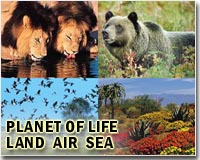| . |  |
. |
Brisbane, Australia (AFP) Jan 16, 2011 Snakes clung to floating debris, crocodiles lurked near homes and sharks swam the streets in Australia's epic floods -- but many more animals died in the deluge, experts say. The devastating floods that smashed through the nation's northeast would have drowned wombats in their burrows, trapped and starved kangaroos in waterlogged paddocks, and deprived many other creatures of food and habitat. The rushing waters, which swept away koalas, lizards and frogs and seethed with snakes, could also have a long-lasting impact on the country's unique wildlife, the Australian Veterinary Association has warned. "The immediate thing is that many would have died," wildlife expert Robert Johnson told AFP. "But the long-term thing is that the ones that would have survived, they don't have much of a habitat." Many animals -- particularly young kangaroos and wallabies -- will likely die over the coming months after falling prey to parasites as they deal with the stresses of their resting and feeding places being wiped out, he said. The dirty brown floodwaters would have also washed away eggs laid by turtles along the Queensland coast and threatened the habitats of frogs -- meaning numbers will be profoundly reduced this year. Torrential rains that have affected an area the size of France and Germany combined over recent weeks, have also washed the nectar off flowers needed by flying foxes to survive, meaning many will be left to fend for themselves as mothers lack the energy to feed them, Johnson added. The Wildlife Information, Rescue and Education Service (WIRES) said baby birds would have been washed from nests and older birds would have difficulty finding food. In some instances young kangaroos, known as joeys would have been swept from their mothers' pouches while others simply drowned in the pouch, WIRES general manager Leanne Taylor said, adding that wet kangaroos were unable to jump as normal and could suffer swollen limbs. "Food sources such as grasses will be washed away, increasing the likelihood that we will be seeing starving animals for months to come," she said. For weeks the Royal Society for the Prevention of Cruelty to Animals has been working to evacuate and care for animals in the flood zone, which covers a vast area of Queensland state, opening temporary refuges and finding accommodation for dogs, cats, horses and other creatures. And with thousands of people evacuated from their homes in the city of Brisbane alone, officials have relented on an original ban on animals and now allow dogs, cats and birds at at least one evacuation centre. But for those communities west of Brisbane hit by flash flooding on January 10 that claimed the lives of at least 16 residents and swept away cars and houses, there was no opportunity to safeguard pets. Bob Doneley, who runs the animal hospital in the Lockyer Valley town of Gatton, said the pets so far retrieved from hard-hit communities such as Grantham had come in "covered in mud". "(They have) surprisingly few injuries but I suspect anything that was injured didn't survive," he told AFP from the treatment centre where he is caring for scores of dogs, cats and birds. He said most animals brought to him eat for at least 15 minutes and then sleep for the rest of the day. "They are starving, they're scared," he said. As the military, emergency personnel and volunteers begin the massive clean-up in the wake of the floods, they are also being warned to be aware that venomous or aggressive animals could be sheltering in abandoned homes. Snakes are posing a threat to cleanup crews in central Queensland, while deadly saltwater crocodiles were spotted nosing around creekside homes in towns including Rockhampton, swamped earlier this month. Bull sharks, usually found in shallow coastal waters, were found in the main street of Goodna, 30 kilometres (20 miles) inland -- a report locals have insisted is "bizarre" but true. In the Queensland town of Dalby, northwest of Brisbane, a snake catcher has been hired to protect some 20 New Zealand emergency service volunteers. "There are no snakes in New Zealand so these poor blokes are pretty spooked by it all," Western Downs Mayor Ray Brown said. "And the Aussies are taking every opportunity to tell them as many scary snake stories as they can," adding that there had been reports of a number of snakes attempting to slither into rescuers' boats to escape the floodwaters. "And there have been lots of stories about snakes getting caught up in trees and as boats go by they're just plopping out of the trees; I mean it's not raining snakes but it's not the most pleasant of places to be," Brown said.
Share This Article With Planet Earth
Related Links Darwin Today At TerraDaily.com
 Wild cat once thought extinct spotted in Borneo
Wild cat once thought extinct spotted in BorneoKuala Lumpur (AFP) Jan 13, 2011 One of the world's rarest wild cats, an elusive creature once thought to be extinct, has been spotted in camera traps in Malaysian Borneo for the first time since 2003, researchers said Thursday. The Bornean Bay Cat, a long-tailed reddish or grey feline the size of a large domesticated cat, was sighted in the northern highlands of Malaysia's Sarawak state, the forest department said Thursday ... read more |
|
| The content herein, unless otherwise known to be public domain, are Copyright 1995-2010 - SpaceDaily. AFP and UPI Wire Stories are copyright Agence France-Presse and United Press International. ESA Portal Reports are copyright European Space Agency. All NASA sourced material is public domain. Additional copyrights may apply in whole or part to other bona fide parties. Advertising does not imply endorsement,agreement or approval of any opinions, statements or information provided by SpaceDaily on any Web page published or hosted by SpaceDaily. Privacy Statement |